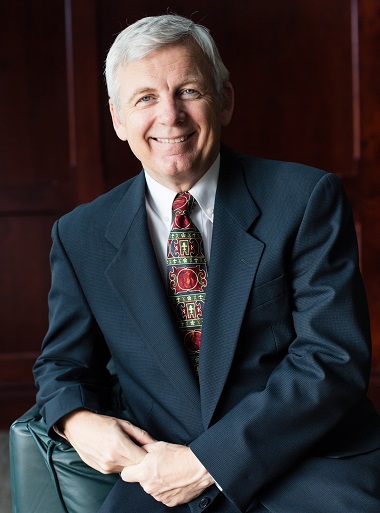
Bob Kuhn, president of Trinity Western University, described the BC Court of Appeal’s decision as “a carefully considered supporting view related to diversity and tolerance in Canada.”
Trinity Western University president Bob Kuhn is pleased with the BC Court of Appeal’s November 1 decision, which rejected an attempt by the Law Society of BC to prevent potential graduates of the law school from practicing in this province.
During an interview with Rick Cluff on The Early Edition November 2 Kuhn said (at 2:21:15 of the podcast):
I think it is, by all admissions, a very well-reasoned decision. I think it is a carefully considered supporting view related to diversity and tolerance in Canada. I think it is good for everybody.
Archbishop Michael Miller of the Roman Catholic Archdiocese of Vancouver agreed, pointing out that the decision “acknowledges and respects the right to freedom of religion, which is the first freedom guaranteed by in the Canadian Charter of Rights and Freedoms.”
On the other hand, queer feminist lawyer barbara finlay, Q.C., said on CBC’s On the Coast radio show November 1:
We were disappointed in the ruling. . . . Our view is that my freedom of religion ends where your right to be free from discrimination begins, that freedom of religion should be about belief, and about actions which are not discriminatory.
One thing everyone seems to agree on is that the case will likely end up in the Supreme Court of Canada.
Probably the most useful thing at this stage is to look at some of the key legal issues, and the Christian Legal Fellowship (CLF) has done a good job of that. Following is their assessment of the situation, re-posted by permission:
Christian Legal Fellowship: Analysis

Derek Ross, executive director of Christian Legal Fellowship, says the unanimous BC Court of Appeal decision is encouraging.
In its unanimous decision, released November 1, the British Columbia Court of Appeal (BCCA) has ruled in favour of Trinity Western University (TWU).
The five-judge panel of BC’s highest court concluded that it was unreasonable for the Law Society of British Columbia (LSBC) to reject TWU’s proposed law school, “[i]n light of the severe impact of non-approval on the religious freedom rights at stake and the minimal impact of approval on the access of LGBTQ persons to law school and the legal profession . . .” (para. 191).
Christian Legal Fellowship intervened in the litigation in support of TWU’s position and welcomes the Court of Appeal’s decision.
Derek Ross, CLF’s executive director and legal counsel in this intervention, comments:
It is encouraging to see the British Columbia Court of Appeal unanimously affirm true diversity in today’s decision. True diversity demands grace and tolerance in order to live respectfully with disagreement.
The Law Society’s decision to reject TWU purported to advance diversity, but actually undermined it, by preventing religious graduates with diverse beliefs and opinions from joining the profession.
This version of “diversity” ends at the point of conflicting, unfashionable views. It excludes individuals who hold to a particular view of marriage, despite Supreme Court of Canada jurisprudence and clear legislative direction that “it is not against the public interest to hold and publicly declare diverse views on marriage.” This is not diversity, but intolerance.
CLF is pleased to see a number of the arguments and positions put forward in both its written and oral submissions reflected in the Court’s decision.
Decision
In its concluding reflection on the importance of accommodating differences in a free and democratic society the BCCA held:
A society that does not admit of and accommodate differences cannot be a free and democratic society – one in which its citizens are free to think, to disagree, to debate and to challenge the accepted view without fear of reprisal. This case demonstrates that a well-intentioned majority acting in the name of tolerance and liberalism, can, if unchecked, impose its views on the minority in a manner that is in itself intolerant and illiberal.
In coming to the conclusion that the LSBC failed to properly weigh the Charter rights impacted by its decision not to approve TWU’s proposed law school, the BCCA made a number of key findings.
The Court observed that the impact on TWU’s right to freedom of religion was “severe,” since its graduates could not apply to practice law in British Columbia (para. 168).
It rejected the LSBC’s suggestion that since TWU was still free to operate an unaccredited law school, its rights were only minimally impacted (a point also accepted in the reasons of the Ontario Court of Appeal in companion litigation), stating “[s]uch a contention fails to recognize that the main function of a faculty of law is to train lawyers” (para.169).
It had also been argued that the LSBC was justified in rejecting TWU so as not to “endorse” the “discriminatory” aspects of its admissions policy. This was rejected by the BC Court of Appeal, which described this premise as “misconceived” (paras. 184-185):
In a diverse and pluralistic society, this argument must be treated with considerable caution. If regulatory approval is to be denied based on the state’s fear of being seen to endorse the beliefs of the institution or individual seeking a license, permit or accreditation, no religious faculty of any kind could be approved. Licensing of religious care facilities and hospitals would also fall into question.
State neutrality is essential in a secular, pluralistic society. Canadian society is made up of diverse communities with disparate beliefs that cannot and need not be reconciled.
While the state must adopt laws on some matters of social policy with which religious and other communities and individuals may disagree (such as enacting legislation recognizing same-sex marriage), it does so in the context of making room for diverse communities to hold and act on their beliefs.
This approach is evident in the Civil Marriage Act, S.C. 2005, c. 33 itself, which expressly recognizes that “it is not against the public interest to hold and publicly express diverse views on marriage.”
The BCCA acknowledged that approval of TWU’s law school might have a “potential detrimental effect on LGBTQ rights,” but stressed that any such impact “must be considered in context and concretely” (paras. 171-173). Specifically, the court concluded that the impact on accessibility to law school for LGBTQ students would be insignificant in real terms (para. 178):
TWU is a relatively small community of like-minded persons bound together by their religious principles. It is not for everyone. For those who do not share TWU’s beliefs, there are many other options.
It has been suggested in argument that TWU is, in effect, a segregated community, and that the accreditation of its law program would amount to the endorsement of a “separate but equal” doctrine. We are not persuaded that that is a fair characterization.
The long discredited “separate but equal” doctrine was offensive because it forced segregation on an oppressed minority. In the context of this case, the members of the TWU community constitute a minority. A clear majority of Canadians support the marriage rights of the LGBTQ community, and those rights enjoy constitutional protection.
The majority must not, however, be allowed to subvert the rights of the minority TWU community to pursue its own values. Members of that community are entitled to establish a space in which to exercise their religious freedom.
Finally, the Court addressed the submission, made by the Law Society intervenors and accepted by the Ontario Court of Appeal, that TWU’s Community Covenant “is deeply discriminatory, and it hurts” (paras. 188-189):
The balancing of conflicting Charter rights requires a statutory decision-maker to assess the degree of infringement of a decision on a Charter right.
While there is no doubt that the Covenant’s refusal to accept LGBTQ expressions of sexuality is deeply offensive and hurtful to the LGBTQ community, and we do not in any way wish to minimize that effect, there is no Charter or other legal right to be free from views that offend and contradict an individual’s strongly held beliefs, absent the kind of “hate speech” described in Whatcott that could incite harm against others (see paras. 82, 89-90 and 111).
Disagreement and discomfort with the views of others is unavoidable in a free and democratic society.
Indeed, it was evident in the case before us that the language of “offence and hurt” is not helpful in balancing competing rights. The beliefs expressed by some Benchers and members of the Law Society that the evangelical Christian community’s view of marriage is “abhorrent,” “archaic” and “hypocritical” would no doubt be deeply offensive and hurtful to members of that community.
CLF’s key arguments
In its factum, CLF asserted that the public interests in equality, diversity and pluralism include welcoming religious minorities as active participants in society. In particular, CLF argued that the LSBC’s decision infringes on the freedom of religion and association of law students who wish to study law at an institution with an underlying Christian philosophy and viewpoint.
As CLF argued, the “LSBC does not have a mandate to interfere with civil society and its institutions or associations in an attempt to ensure that all students are comfortable with abiding by their lawful internal policies.” In its attempt to do so, LSBC undermined the public interest, stifled diversity of belief and opinion and violated state neutrality.
To read CLF’s written submissions to the BC Court of Appeal, click here.
Other organizations also intervened in support of TWU’s position, and include The Association for Reformed Political Action (ARPA) Canada, Canadian Council of Christian Charities, The Evangelical Fellowship of Canada & Christian Higher Education Canada, Justice Centre for Constitutional Freedoms, The Roman Catholic Archdiocese of Vancouver & the Catholic Civil Rights League & the Faith and Freedom Alliance, and The Seventh-Day Adventist Church in Canada.
Status of litigation in other provinces
In Nova Scotia, the Barristers’ Society opted not to apply for leave to appeal to the Supreme Court of Canada, after that province’s Court of Appeal ruled in favour of TWU.
In Ontario, the Court of Appeal ruled against TWU, prompting an application by TWU to the Supreme Court of Canada for leave to appeal. The application for leave awaits a ruling.
CLF has intervened at all levels of court in the litigation surrounding TWU’s proposed law school thus far, and remains committed to defending the fundamental freedoms of religious lawyers and law students as matters progress. In light of conflicting decisions from the various provincial Courts of Appeal, it is anticipated that the matter will be heard and decided upon by the Supreme Court of Canada.
Brief background of the case
The LSBC originally voted in favour of recognizing TWU’s proposed school of law, which had already been accredited by the Federation of Law Societies of Canada. The LSBC subsequently reversed its decision based on a referendum of its members, primarily motivated by objections to TWU’s Community Covenant, and in particular, its biblical view of marriage as expressed therein.
Before the BC Supreme Court, TWU was successful in its judicial review application of the LSBC decision. Justice Hinkson made his decision on administrative law grounds, holding that the LSBC wrongly fettered its discretion, thus violating procedural fairness, allowing itself to be bound by a popular vote. It also failed to give TWU a meaningful opportunity to fully and fairly present its case, a finding with which the Court of Appeal disagreed.
With respect to the Charter freedoms at stake, Justice Hinkson commented, “I am not persuaded that the circumstances or the jurisprudence respecting human rights have so fundamentally shifted the parameters of the debate as to render the decision in TWU v. BCCT other than dispositive of many of the issues in this case.” [The Supreme Court of Canada found for Trinity Western as it sought to open a teacher training program to which the BC College of Teachers was opposed.]
